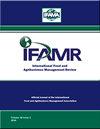影响同源保存产品成功的因素的动态系统分析:以高油酸大豆为例
IF 1.5
4区 经济学
Q3 AGRICULTURAL ECONOMICS & POLICY
International Food and Agribusiness Management Review
Pub Date : 2022-10-07
DOI:10.22434/ifamr2021.0132
引用次数: 0
摘要
有助于身份保护(IP)产品成功的因素在概念上被理解,但很少被量化。系统动力学建模和与价值链利益相关者的组建模的组合提供了一种可推广的方法来量化单个因素的相对重要性,并确定评估市场潜力所需的信息。IP高油酸大豆油(HOSO)的有限生长为这些方法的应用提供了实例。HOSO的具体假设和结果将与其他知识产权产品不同,但有些结果似乎是可以概括的。首先,需要长期记录关键驱动因素的价值,包括知识产权的相对成本和意识到潜在利益的潜在最终用户的比例。由于持续的成本优势是HOSO最终用户转换行为的关键驱动因素,因此了解相对成本随时间变化的模式对于制定切合实际的销售增长估计非常重要。同样,我们的分析表明,对最终用户意识的评估很重要,这可能需要使用替代的沟通渠道,并由整个价值链的关键决策者(包括产品配方师和采购人员)进行监测。本文章由计算机程序翻译,如有差异,请以英文原文为准。
A dynamic systems analysis of factors affecting success of identity-preserved products: the case of high-oleic soybeans
The factors contributing to success of identity-preserved (IP) products are understood conceptually, but are rarely quantified. A combination of system dynamics modeling and group modeling building with value chain stakeholders provides a generalizable approach to quantify the relative importance of individual factors and identify information needed to assess market potential. The limited growth of IP high-oleic soybean oil (HOSO) provides a case example for application of these methods. The specific assumptions and results for HOSO will differ from other IP products, but some outcomes appear generalizable. First, the values of key drivers need to be documented over time, including the relative cost of the IP and the proportion of potential end users that are aware of the potential benefits. Because sustained cost advantages are a key driver of end-user switching behavior for HOSO, understanding the patterns for relative costs over time would be important to develop realistic estimates of sales growth. Similarly, our analyses suggest that assessment of end-user awareness is important, which may require use of alternative communication channels and monitoring efforts by key decision makers throughout the value chain, including product formulators and procurement staff.
求助全文
通过发布文献求助,成功后即可免费获取论文全文。
去求助
来源期刊

International Food and Agribusiness Management Review
AGRICULTURAL ECONOMICS & POLICY-
CiteScore
2.90
自引率
0.00%
发文量
0
审稿时长
>12 weeks
期刊介绍:
The IFAMR is an internationally recognized catalyst for discussion and inquiry on issues related to the global food and agribusiness system. The journal provides an intellectual meeting place for industry executives, managers, scholars and practitioners interested in the effective management of agribusiness firms and organizations.
IFAMR publishes high quality, peer reviewed, scholarly articles on topics related to the practice of management in the food and agribusiness industry. The Journal provides managers, researchers and teachers a forum where they can publish and acquire research results, new ideas, applications of new knowledge, and discussions of issues important to the worldwide food and agribusiness system. The Review is published electronically on this website.
The core values of the Review are as follows: excellent academic contributions; fast, thorough, and detailed peer reviews; building human capital through the development of good writing skills in scholars and students; broad international representation among authors, editors, and reviewers; a showcase for IFAMA’s unique industry-scholar relationship, and a facilitator of international debate, networking, and research in agribusiness.
The Review welcomes scholarly articles on business, public policy, law and education pertaining to the global food system. Articles may be applied or theoretical, but must relevant to managers or management scholars studies, industry interviews, and book reviews are also welcome.
 求助内容:
求助内容: 应助结果提醒方式:
应助结果提醒方式:


